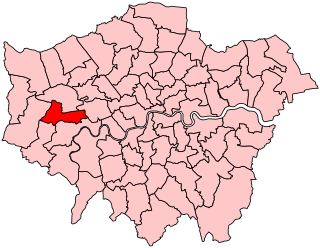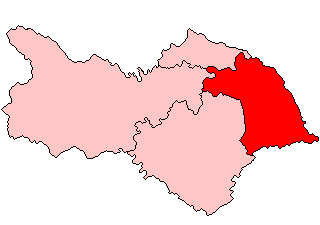Related Research Articles
Isle of Ely was a county constituency represented in the House of Commons of the Parliament of the United Kingdom, centred on the Isle of Ely in Cambridgeshire. Until its abolition in 1983, it elected one Member of Parliament (MP) by the first past the post system of election.
Wednesbury was a borough constituency in England's Black Country which returned one Member of Parliament (MP) to the House of Commons of the Parliament of the United Kingdom from 1868 until it was abolished for the February 1974 general election.
The Morpeth by-election, 1923 was a by-election held for the British House of Commons constituency of Morpeth in Northumberland on 21 June 1923. The seat had become vacant on the death in May 1923 of the constituency's Labour Member of Parliament (MP) John Cairns, who had held the seat since the 1918 general election.

The Islington East by-election, 1931 was a parliamentary by-election held on 19 February 1931 for the House of Commons constituency of Islington East in Islington, North London.
The Altrincham by-election, 1933 was a parliamentary by-election held on 14 June 1933 for the British House of Commons constituency of Altrincham in Cheshire.
The Nottingham Central by-election, 1930 was a parliamentary by-election held on 27 May 1930 for the British House of Commons constituency of Nottingham Central.
The Gateshead by-election, 1931 was a parliamentary by-election held on 8 June 1931 for the British House of Commons constituency of Gateshead.

The Ealing Southall by-election, 2007 was a by-election for the British House of Commons constituency of Ealing Southall, in west London. It was held on 19 July 2007.
The Kilmarnock by-election, 1929 was a by-election held on 27 September 1929 for the British House of Commons constituency of Kilmarnock in Ayrshire.
The Darlington by-election, 1926 was a by-election held on 17 February 1926 for the British House of Commons constituency of Darlington in County Durham.
The Bishop Auckland by-election, 1929 was a parliamentary by-election held on 7 February 1929 for the British House of Commons constituency of Bishop Auckland in County Durham.
The Liverpool Wavertree by-election, 1931 was a parliamentary by-election held in England for the House of Commons constituency of Liverpool Wavertree on 23 June 1931. It was won by the Conservative Party candidate Ronald Nall-Cain.

The Westminster St. George's by-election, 1931 was a parliamentary by-election held on 19 March 1931 for the British House of Commons constituency of Westminster St. George's.

The North Cornwall by-election, 1932 was a parliamentary by-election held on 22 July 1932 for the British House of Commons constituency of North Cornwall.

Sir Sydney Walter John Robinson JP was an English farmer, building contractor and Liberal politician.
The Midlothian and Peebles Northern by-election, 1929 was a parliamentary by-election held in Scotland on 29 January 1929 to elect a new Member of Parliament (MP) for the House of Commons constituency of Midlothian and Peebles Northern.
The St Albans by-election of 1919 was a parliamentary by-election held in England in December 1919 for the House of Commons constituency of St Albans in Hertfordshire.
This was a parliamentary by-election for the British House of Commons constituency of Northampton.
The Shipley by-election was a parliamentary by-election for the British House of Commons constituency of Shipley on 6 November 1930.

The Scarborough and Whitby by-election was a parliamentary by-election for the British House of Commons constituency of Scarborough and Whitby on 6 May 1931.
References
- Craig, F. W. S. (1983) [1969]. British parliamentary election results 1918–1949 (3rd ed.). Chichester: Parliamentary Research Services. ISBN 0-900178-06-X.
- Ball, Stuart (1988). Baldwin and the Conservative Party . London. ISBN 0-300-03961-1.